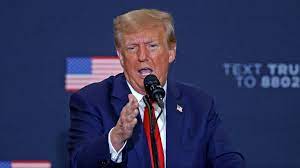U.S. Supreme Court declines push to fast-track ruling in Trump’s case

![]()

The U.S. Supreme Court ruled on Friday it will not immediately take up a plea by special counsel Jack Smith to rule on whether former President Donald Trump can be prosecuted for his actions to overturn the 2020 election results.
The ruling is a scheduling win for Trump and his lawyers, who have sought repeatedly to delay the criminal cases against him as he campaigns to reclaim the White House in 2024. It averts a swift ruling from the nation’s highest court that could have definitively turned aside his claims of immunity, and it further throws into doubt the possibility of the landmark trial proceeding as scheduled on March 4.
The issue will now be decided by the U.S. Court of Appeals for the District of Columbia Circuit, which has signaled it will act quickly to decide the case. Special counsel Jack Smith had cautioned that even a rapid appellate decision might not get to the Supreme Court in time for review and final word before the court’s traditional summer break.
Smith had pressed the Supreme Court to intervene, citing significant public interest in a prompt resolution to the case. The request to leapfrog the appeals court, which Smith himself acknowledged was “extraordinary,” also underscored prosecutors’ concerns that the fight over the issue could delay the start of Trump’s trial beyond next year’s presidential election.
The justices turned down Smith’s request in a single-sentence order Friday. As is customary, the court gave no explanation for the decision.
With the justices remaining out of the dispute for now, additional appeals are likely that could delay the case. If the appeals court, which is set to hear arguments on Jan. 9, turns down Trump’s immunity claims, he could then ask for the Supreme Court to get involved — giving the justices another opportunity to decide if they want to weigh in.
U.S. District Judge Tanya Chutkan has already put the case on hold while Trump pursues his claim that he is immune from prosecution. Chutkan has raised the possibility of keeping the March trial date if the case promptly returns to her court.
AP




